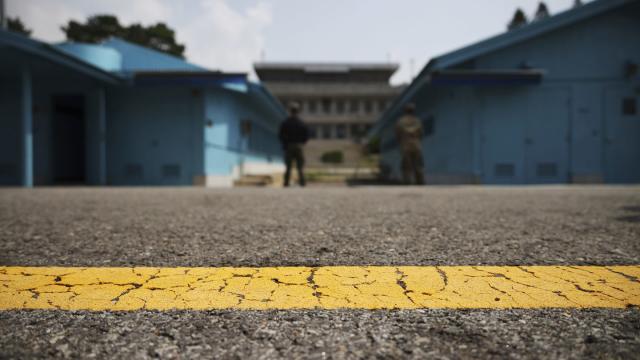US soldier who fled to North Korea was facing disciplinary action

Views (62)

U.S. officials say an American soldier who fled across the border from South Korea into North Korea had been facing military disciplinary actions.
Editor’s note: This is a developing story. It was last updated on July 18, 2023 at 6:05 pm EST and also contains information provided to Military Times from the Army.
Private 2nd Class Travis King had been held on assault charges and was released on July 10 after serving his time. He was being sent home to Fort Bliss, Texas, on Monday, where he could have faced additional military disciplinary actions and discharge from the service.
The Army released his name and limited information after King’s family was notified of the incident. But a number of U.S. officials provided additional details on condition of anonymity because of the sensitivity of the matter. It wasn’t clear how he got to the border or how he spent the hours between leaving the airport on Monday and crossing the border a day later.
At a Pentagon press conference Tuesday, Defense Secretary Lloyd Austin confirmed that the U.S. service member was likely now in North Korean custody.
“We’re closely monitoring and investigating the situation and working to notify the soldier’s next of kin,” Austin said, noting he was foremost concerned about the troop’s wellbeing. “This will develop in the next several days and hours, and we’ll keep you posted.”
According to Army spokesman Bryce Dubee, King is a cavalry scout who joined the service in January 2021. He was in Korea as part of the 1st Armored Division.
The American-led U.N. Command said he is believed to be in North Korean custody and the command is working with its North Korean counterparts to resolve the incident. North Korea’s state media didn’t immediately report on the border crossing.
King’s awards include the National Defense Service Medal, the Korean Defense Service Medal and the Overseas Service Ribbon, according to the Army.
Cases of Americans or South Koreans defecting to North Korea are rare, though more than 30,000 North Koreans have fled to South Korea to avoid political oppression and economic difficulties since the end of the 1950-53 Korean War.
Panmunjom, located inside the 248-kilometer-long (154-mile) Demilitarized Zone, has been jointly overseen by the U.N. Command and North Korea since its creation at the close of the Korean War. Bloodshed and gunfire have occasionally occurred there, but it has also been a venue for numerous talks and is a popular tourist spot.
Tours to the southern side of the village reportedly drew around 100,000 visitors a year before the coronavirus pandemic, when South Korea restricted gatherings to slow the spread of COVID-19. The tours resumed fully last year. During a short-lived period of inter-Korean engagement in 2018, Panmunjom was one of the border sites that underwent mine-clearing operations by North and South Korean army engineers as the Koreas vowed to turn the village into a “peace zone” where tourists from both sides could move around with more freedom.
The most famous incident at Panmunjom happened in August 1976, when two American army officers were killed by ax-wielding North Korean soldiers. The U.S. officers had been sent to trim a 40-foot (12-meter) tree that obstructed the view from a checkpoint. The attack prompted Washington to fly nuclear-capable B-52 bombers toward the DMZ to intimidate North Korea.
Panmunjom also is where the armistice that ended the Korean War was signed. That armistice has yet to be replaced with a peace treaty, leaving the Korean Peninsula technically in a state of war. The United States still stations about 28,000 troops in South Korea.
But in recent years, some American civilians have been arrested in North Korea after allegedly entering the country from China. They were later convicted of espionage, subversion and other anti-state acts, but were often released after the U.S. sent high-profile missions to secure their freedom.
The 2018 releases came as North Korean leader Kim Jong Un was engaged in nuclear diplomacy with then-President Donald Trump. The high-stakes diplomacy collapsed in 2019 amid wrangling over U.S.-led sanctions on North Korea.
The United States, South Korea and others have accused North Korea of using foreign detainees to wrest diplomatic concessions. Some foreigners have said after their release that their declarations of guilt were coerced while in North Korean custody.
Sean Timmons, a managing partner at the Tully Rinckey law firm, which specializes in military legal cases, said if King is trying to present himself as a legitimate defector fleeing either political oppression or persecution, he would be dependent on North Korea’s leadership to decide if he can stay.
He said it will likely be up to North Korean leader Kim Jong Un to decide King’s fate.
“It’s going to be up to the whims of their leadership, what they want to do,” Timmons said.
Copp reported from Washington. Associated Press writers Matthew Lee and Zeke Miller in Washington contributed to this report.
0 Likes
